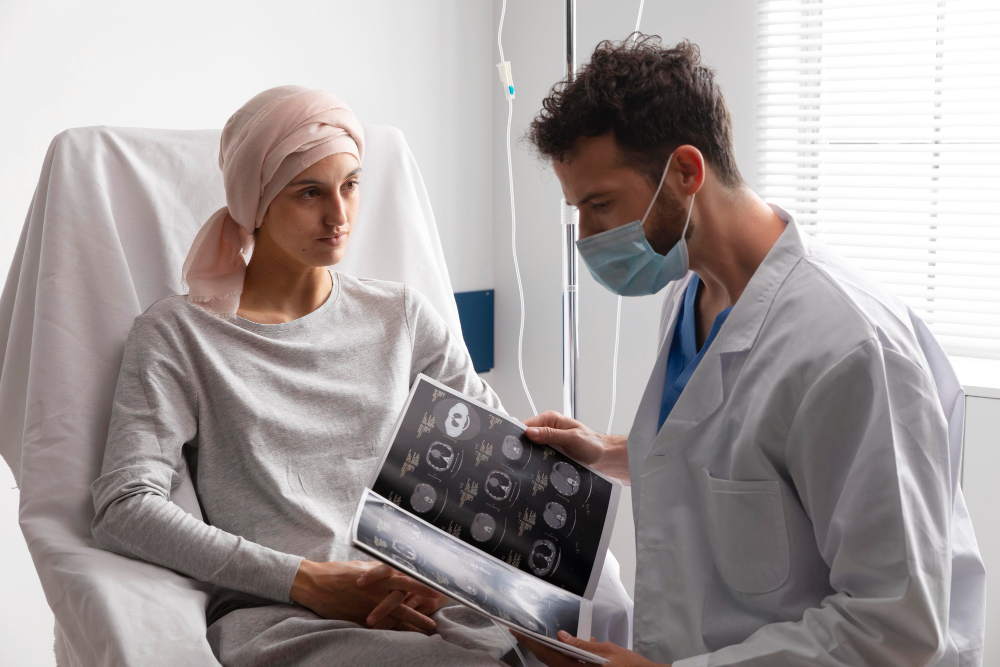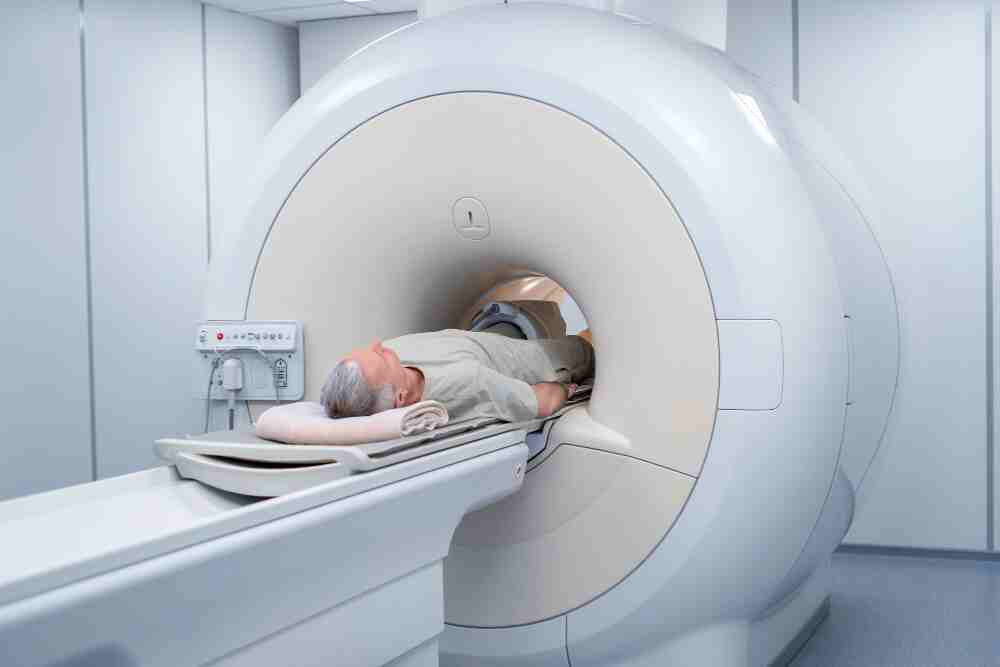Book on Whatsapp
9892101616
Kanchipuram, Tamil Nadu’s First and Finest: Experience Cutting-Edge Pet CT Scans-Manipal TRUtest!
Cancer
Tue Feb 20 2024
Beat major ailments when you spot initial signs because early detection is the key to early prevention. A crucial check-up like PET-CT Scan is, generally,is one of those uncommon tests recommended by Doctors. Looking for ‘Book PET CT scan Near me’, dear Kanchipuram natives? Rest your worries on us! We have a piece of great news for you!
Kanchipuram natives can rejoice and be relieved from the woes of running from pillar to post for a crucial test like PET-CT Scan. Manipal TRUtest has launched the first-ever PET-CT Scan Centre in Kanchipuram. Understanding the hassles of travelling from states and cities bordering Kanchipuram, the natives of Kanchipuram can take a sigh of relief as the increasing expenses of travel can be saved and the inhabitants can rush to our brand new PET-CT Scan centre for tests at the last minute. Let’s dive into the world of PET-CT Scan and gain all the necessary information about it. Dive in.
What is a PET CT Scan?
PET-CT, or PET/CT, is a nuclear medicine imaging modality that combines both anatomic (CT scan) and functional imaging (positron emission tomography or PET scan). This enables the simultaneous acquisition of sequential pictures from both scanners, which are subsequently merged to create a single overlaid (co-registered) image.
During the process, a radiopharmaceutical is delivered into the patient's circulation, causing positron emission. When the positrons collide with electrons in the body, they release gamma rays, which are detected by a PET scanner. A CT scanner is then used to produce detailed images. The PET and CT images are combined to create a 3D image of the body’s internal structures.
Why is a PET CT Scan Performed?
PET CT scans are performed to diagnose and manage or treat a variety of oncological and non-oncological conditions, including cancer, heart disease and neurological disorders. They can be used to detect the presence of cancer, determine the stage of cancer, monitor the effectiveness of cancer treatment, and detect potential cancer recurrence.
Advantages
A PET/CT scan consists of two sections: a PET scan and a CT scan. The CT scan part creates a three-dimensional image of a patient's anatomy. In contrast to the CT scan, which records morphological alterations, the PET scan reveals function and internal processes at the cellular level that precede anatomical changes. This aids in early diagnosis crucial for both oncological and many non-oncological treatments. Also, the addition of a functional part helps in accurate and objective response assessment to treatment along with early detection of disease recurrence.
Eye-opening findings
A case of melanoma of the right thumb underwent PET CT for staging. On Clinical examination and USG, no significant locoregional nodes were found; however, PET CT revealed a subcentemetric ipsilateral epitrochlear and right axially level I lymph nodes with significant FDG uptake. A biopsy was then performed, which revealed that the lymph node was malignant. As a result, PET CT was effective in upstaging the disease in this case. The patient because of upstaging was promptly referred to medical oncology for further immunotherapy.
Similarly, a young girl presented a PET scan was performed to evaluate a case of a giant cell tumour of a dorsal vertebra. Multiple FDG avid lytic lesions and an enlarged parathyroid lesion were found on the PET scan, raising the possibility of parathyroid adenoma with brown tumours. Later, histopathology was revised resulting in the diagnosis being changed from malignant to benign disease.
Benefits of PET CT Scans in Diagnosis:
Accurate Diagnoses, Noninvasive, Whole body imaging, Targeted procedures, Treatment Plans and Quick Results.
Limitations
Despite being a non-invasive and safe process, a PET CT scan does expose the patient to radiation from the radioactive tracer. Nonetheless, the radiation dose is negligible and not thought to pose a risk to patients. Furthermore, the advantages of early cancer detection and treatment exceed any scan-related dangers by a wide margin.
Manipal TRUtest offers a wide range of diagnostic services with assured quality, accuracy, and trust backed by 70 years of Manipal legacy. You can easily schedule a blood test, MRI, X-RAY, CT-Scan, PET-CT-Scan and more Radiology services through our WhatsApp Chatbot, Mobile App, or Website. You can simply visit the nearest Manipal TRUtest Centre.
OUR PRESENCE
Blood Test Centre in India
Blood Test Center in Hyderabad / Blood Test Center in Kolkata / Blood Test Center in Vizag / Blood Test Center in Mumbai / Blood Test Center in Ghatkopar / Blood Test Center in Kolhapur / Blood Test Center in Pune / Blood Test Center in Solapur / Blood Test Center in Rohtak / Blood Test Center in Indore / Blood Test Center in Gurugram / Blood Test Center in Ghaziabad/ Blood Test Center in Bangalore / Blood Test Center in Nashik / Blood Test Center in Nagpur
CT-Scan Centres in India
CT Scan Centre in Bhiwani/ CT Scan Centre in Gurugram/ CT Scan Centre in Jind / CT Scan Centre in Hisar/ CT Scan Centre in Kaithal/ CT Scan Centre in Kurukshetra / CT Scan Centre in Mewat/ CT Scan Centre in Sonipat/ CT Scan Centre in Panchkula/ CT Scan Centre in Panipat / CT Scan Centre in Rohtak/ CT Scan Centre in Yamunanagar/ CT Scan Centre in Daltonganj / CT Scan Centre in Deoghar/ CT Scan Centre in Dhanbad / CT Scan Centre in Dumka/ CT Scan Centre in Hazaribagh/ CT Scan Centre in Koderma/ CT Scan Centre in Ranchi/ CT Scan Centre in Simdega/ CT Scan Centre in Bangalore/ CT Scan Centre in Mangaluru / CT Scan Centre in Manipal / CT Scan Centre in Ghatkopar
PET-CT Scan Centres in India
PET- CT Scan Centre in Vijayawada / PET-CT Scan Centre in Manipal / PET-CT Scan Centre in Jaipur / PET-CT Scan Centre in Kanchipuram / PET-CT Scan Centre in Goa
Ultrasound Centres in India
Ultrasound Scan in Deoghar / Ultrasound Scan in Dumka / Ultrasound Scan in Bokaro Steel City / Ultrasound Scan in Chaibasa / Ultrasound Scan in Giridih / Ultrasound Scan in Godda / Ultrasound Scan in Gumla / Ultrasound Scan in Khunti /Ultrasound Scan in Jamtara / Ultrasound Scan in Pakur / Ultrasound Scan in Simdega / Ultrasound Scan in Manipal / Ultrasound Scan in Ghatkopar East / Ultrasound Scan in Garhwa / Ultrasound Scan in Jamshedpur
MRI Scan Centres in India
MRI Scan in Bhiwani / MRI Scan in Gurugram / MRI Scan in Hisar / MRI Scan in Mewat / MRI Scan in Panchkula / MRI Scan in Rohtak / MRI Scan in Sonipat / MRI Scan in Ranchi / MRI Scan in Bangalore / MRI Scan in Bhubaneswar / MRI Scan in Cuttack
X-Ray Centres in India
X-Ray Centres in Chaibasa / X-Ray Centres in Chatra / X-Ray Centres in Deoghar / X-Ray Centres in Dumka / X-Ray Centres in Garhwa / X-Ray Centres in Giridih / X-Ray Centres in Godda / X-Ray Centres in Gumla / X-Ray Centres in Jamshedpur / X-Ray Centres in Jamtara / X-Ray Centres in Khunti / X-Ray Centres in Latehar / X-Ray Centres in Pakur / X-Ray Centres in Ramgarh / X-Ray Centres in Sahibganj / X-Ray Centres in Simdega / X-Ray Centres in Ghatkopar
ECG Centres in India
ECG Test in Bokaro Steel City / ECG Test in Chatra / ECG Test in Deoghar / ECG Test in Dumka / ECG Test in Garhwa / ECG Test in Giridih / ECG Test in Gumla / ECG Test in Jamshedpur / ECG Test in Jamtara / ECG Test in Khunti / ECG Test in Ramgarh / ECG Test in Simdega / ECG Test in Ghatkopar
Related Blogs

Cancer
How Early Diagnosis Can Improve Cancer Treatment
Cancer treatment outcomes depend heavily on how early the disease is diagnosed. Detecting cancer in its early stages often leads to better survival rates, less invasive treatments, and improved quality of life. Early detection enables timely intervention even before the cancer has spread to other parts of the body, increasing the effectiveness of treatments like surgery and radiation therapy. Regular screenings, awareness of early warning signs, and access to diagnostic tests like colonoscopies, mammograms, and blood tests play a crucial role in identifying that cancer is at a manageable stage.
Methods of Early Diagnosis
Early detection of cancer relies on a variety of diagnostic tools and procedures that help identify the disease at its most treatable stage. Routine screenings such as mammograms, Pap smears, and colonoscopies are essential for detecting cancers like breast, cervical, and colorectal cancer before symptoms appear. Imaging techniques, including CT scans, MRIs, and ultrasounds, allow doctors to view the internal organs and tissues to identify abnormal growths and tumors. Biomarkers and genetic tests can detect early cellular changes and assess an individual's risk for certain cancers, aiding in personalized treatment planning. In cases where abnormal cells are found, biopsies are performed to confirm the diagnosis and determine the cancer type and stage.
Advantages of Early Detection
Early detection of cancer plays a vital role in improving treatment outcomes and long-term health. When cancer is identified at an early stage, it often results in higher survival rates, as the disease is more likely to be localized and treatable. Patients usually require less aggressive treatment, which means fewer side effects and complications compared to advanced-stage interventions. Additionally, early diagnosis can lead to lower treatment costs, as simpler therapies are often more cost-effective than complex, multi-step treatments required for later stages. Patients also benefit from faster recovery and a better quality of life, allowing them to return to normal routines more quickly and with less emotional and physical stress.
Barriers to Timely Diagnosis
Many people delay diagnosis due to fear, stigma, lack of awareness, or poor access to healthcare facilities. These barriers must be addressed through education and better healthcare infrastructure. Fear of cancer often leads individuals to ignore early symptoms, hoping they will resolve on their own. Social stigma can prevent open conversations, especially in communities where discussing illness is taboo. A lack of awareness about the importance of regular screenings and warning signs further contributes to late diagnosis. Moreover, in rural or economically weaker areas, people may not have access to quality healthcare services. Strengthening primary healthcare, training medical staff, and promoting community-based education can bridge these gaps effectively.
Encouraging Preventive Care
Promoting regular screenings, community awareness, and health literacy is essential. Government and healthcare systems must work together to ensure early detection becomes a norm.
Early cancer diagnosis saves lives. It allows for timely treatment, reduces complications, and improves outcomes for patients and their families. By identifying cancer in its initial stages, treatment is often more effective, less invasive, and less costly. It also helps preserve organ function, reduces emotional distress, and supports better long-term recovery and well-being.

Cancer
Empowering Women with Knowledge About Ovarian Cancer
Ovarian cancer is one of the major severe health concerns for women today. A silent interloper often called the "silent killer" because it also creeps in quietly, with symptoms so vague that they are often mistaken for common digestive or menstrual issues.
Bloating, pelvic discomfort, or feeling full too quickly may seem harmless, but when ignored, can lead to delayed diagnosis. However, “forewarned is forearmed.” With increased regular screenings and awareness, women can also rise against this hidden enemy. Knowledge is the power, and when combined with timely medical care, it can turn the tide.
Through the reliable health checkups, like those offered by Manipal TRUtest, women can also catch early signs, seek instant help, and beat the odds. Encouraging open conversations, supporting one another, and removing the fear surrounding cancer can truly save lives. It is time to break the silence, and empower every woman to prioritize her health because prevention is always better than a cure.
Understanding Ovarian Cancer
Ovarian cancer begins in the ovaries, the organs in charge of producing eggs in women. It often goes unnoticed until it spreads to other parts of the body. Common signs include:
- Frequent urination
- Pelvic pain
- Unexplained weight loss or fatigue
- Bloating or swelling in the abdomen
- Feeling full quickly while eating
If you experience these symptoms often, consult your doctor.
Risk Factors
Some women are more at risk than others. The main risk factors are:
- Family history of ovarian or breast cancer
- Endometriosis
- Genetic mutations (BRCA1 or BRCA2)
Knowing your risk helps you stay alert.
Importance of Regular Screening
The regular health checkups, especially after the age of 40, is important. At Manipal TRUtest, you can get access to affordable women's health checkups. These include ultrasound, CA-125 blood test, and consultation with specialists. Early detection leads to better treatment results.
Healthy Lifestyle for Prevention
The healthy lifestyle for prevention is
- Avoiding tobacco
- Discussing preventive options with your doctor if you have a family history
- Eating a healthy diet rich in fruits and vegetables
- Exercising regularly
Emotional Support Matters
The emotional support matters as a cancer diagnosis can be emotionally overwhelming. Women need support from family, friends, and professionals. Talking openly and joining support groups can help reduce anxiety and fear.
Take Action Today
Don't wait for symptoms to get worse. Take charge of your health. Book a women's wellness package at Manipal TRUtest and consult a healthcare expert. Remember, awareness, prevention, and early diagnosis are your best defense against ovarian cancer.

Cancer
The Role of Whole-Body PET Scans in Cancer Diagnosis
Early recognition of cancer is often the key to successful treatment . One of the most powerful tools in modern medicine for early cancer detection is the whole-body PET scan. This advanced imaging technique enables doctors to view cellular activity throughout the body, often revealing disease before physical symptoms appear—offering a clearer picture than many traditional scans.
What is a Whole-Body PET Scan?
A PET scan (Positron Emission Tomography) is a specialized diagnostic testthat helps doctors understand how tissues and organs are functioning. In a whole-body PET scan, the entire body is scanned in a single session, making it easier to detect cancer that may have spread.
During the test:
- A small, safe dose of radioactive tracer is injected into a vein.
- This tracer travels through the bloodstream and is absorbed by cells with high energy usage—like cancer cells.
- The PET scanner captures detailed images, highlighting areas where the tracer accumulates.
How Whole-Body PET Scans Help in Cancer Diagnosis
Cancer cells behave differently than normal cells—they divide rapidly and consume more energy. As a result, they take up more of the radioactive tracer, which causes them to "glow" on the scan. This makes it easier for physicians to:
• Detect cancer early—even before symptoms begin• Determine whether cancer has spread (metastasized)
• Evaluate how well current treatment is working
• Guide biopsy procedures to the most affected area
• Plan surgery or radiation therapy with greater accuracy
A PET scan provides a comprehensive image, assist doctors in more accurate diagnoses and improved treatment plans.
Who Should Consider a Whole-Body PET Scan?
Your doctor may recommend a PET scan if:
- You are undergoing treatment and doctors need to check the response.
- There is a suspicion that cancer has returned after treatment.
- You are showing signs that could indicate cancer.
- There is a need to stage the cancer and find out how far it has spread.
People with a high risk of cancer, such as those with a family history of the disease, may also be advised to undergo a PET scan for early detection.
Is a Whole-Body PET-CT Scan Safe?
Safety is a common concern. PET scans involve a very small amount of radiation, and the benefits of early detection generally far outweigh the risks. However, it's important to inform your healthcare provider if you are pregnant or breastfeeding, as special precautions may be needed.
How to Prepare for Your PET-CT Scan? To get the most accurate results:
- You may need to fast for several hours before the scan (water is usually allowed and encouraged)
- Wear loose, comfortable clothing
- Remove any metal objects like jewelry
- Follow any specific instructions provided by your healthcare team
Whole-body PET-CT scans are a vital tool in the early detection and treatment of cancer. They provide information that cannot be detected with standard scans, allowing physicians to detect disease earlier and treat it more successfully. If your physician recommends it, having a PET scan can be an crucial step toward safeguarding your health and well-being.
